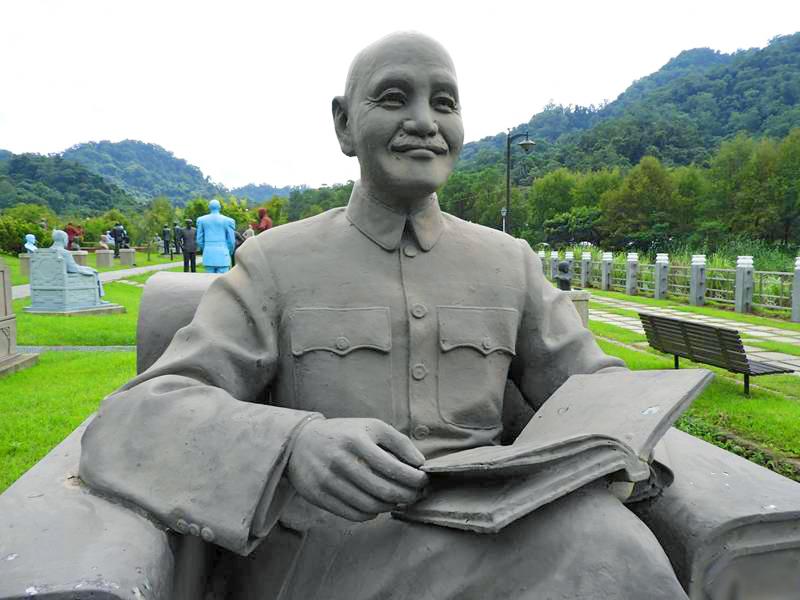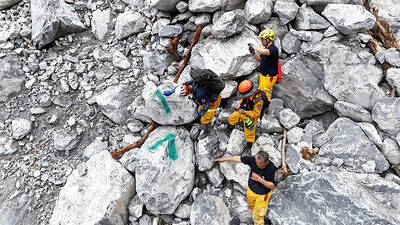The Transitional Justice Commission has outlined the operations of the former state security apparatus and its role in the oppression of Taiwanese in an update on the commission’s ongoing historical research.
Chiang Kai-shek (蔣介石), as the autocratic leader of the state, as well as military courts and the Republic of China’s national security and espionage apparatus were the main agents of oppression during the White Terror era, the commission’s The Mission Implementation and Investigative Outcomes Report said.
The one-party state system provided an overarching framework in which oppressive rule was carried out, the report added.

Photo: Chen Yu-fu, Taipei Times
In a bid to solidify his rule, Chiang presided over the enactment or amendment of laws that applied military jurisprudence over civilians, it said.
These laws included the Temporary Provisions Effective During the Period of National Mobilization for Suppression of the Communist Rebellion (動員戡亂時期臨時條款), the Martial Law Act (戒嚴法) and the Punishment of Rebellion Act (懲治叛亂條例), the report said.
Laws governing political crimes were broadly construed to enable them to be arbitrarily used by the state, it said.
In particular, the features of regulations led to the conflation of the command authorities and judicial power, which abetted political extrajudicial interventions by Chiang, the supreme military commander, the report said.
Historical records showed that Chiang intervened in 80 percent of cases where a military court overturned an initial ruling and replaced it with punishments that were more severe, with 30 percent of cases resulting in a death sentence, it said.
Historical documents reviewed by the commission lent credence to the idea that Chiang’s personal intervention was critical in the imposition of heavier sentences in such cases, the report said.
Moreover, Chiang’s preference for severely punishing dissent created a culture among military judges of imposing heavier sentences to please him, it said.
The gradual introduction of an independent judiciary and right to legal counsel in the mid to late 1950s led to a reduction in the severity of these laws and helped lessen the role of military courts, it said.
The Transitional Justice Database has so far identified 21,257 victims of state violence, and the commission is making use of the platform to identify perpetrators, including military judges and administrators, along with political leaders, including Chiang, the report said.

Former president Ma Ying-jeou’s (馬英九) mention of Taiwan’s official name during a meeting with Chinese President Xi Jinping (習近平) on Wednesday was likely a deliberate political play, academics said. “As I see it, it was intentional,” National Chengchi University Graduate Institute of East Asian Studies professor Wang Hsin-hsien (王信賢) said of Ma’s initial use of the “Republic of China” (ROC) to refer to the wider concept of “the Chinese nation.” Ma quickly corrected himself, and his office later described his use of the two similar-sounding yet politically distinct terms as “purely a gaffe.” Given Ma was reading from a script, the supposed slipup

Former Czech Republic-based Taiwanese researcher Cheng Yu-chin (鄭宇欽) has been sentenced to seven years in prison on espionage-related charges, China’s Ministry of State Security announced yesterday. China said Cheng was a spy for Taiwan who “masqueraded as a professor” and that he was previously an assistant to former Cabinet secretary-general Cho Jung-tai (卓榮泰). President-elect William Lai (賴清德) on Wednesday last week announced Cho would be his premier when Lai is inaugurated next month. Today is China’s “National Security Education Day.” The Chinese ministry yesterday released a video online showing arrests over the past 10 years of people alleged to be

The bodies of two individuals were recovered and three additional bodies were discovered on the Shakadang Trail (砂卡礑) in Taroko National Park, eight days after the devastating earthquake in Hualien County, search-and-rescue personnel said. The rescuers reported that they retrieved the bodies of a man and a girl, suspected to be the father and daughter from the Yu (游) family, 500m from the entrance of the trail on Wednesday. The rescue team added that despite the discovery of the two bodies on Friday last week, they had been unable to retrieve them until Wednesday due to the heavy equipment needed to lift

THE HAWAII FACTOR: While a 1965 opinion said an attack on Hawaii would not trigger Article 5, the text of the treaty suggests the state is covered, the report says NATO could be drawn into a conflict in the Taiwan Strait if Chinese forces attacked the US mainland or Hawaii, a NATO Defense College report published on Monday says. The report, written by James Lee, an assistant research fellow at Academia Sinica’s Institute of European and American Studies, states that under certain conditions a Taiwan contingency could trigger Article 5 of NATO, under which an attack against any member of the alliance is considered an attack against all members, necessitating a response. Article 6 of the North Atlantic Treaty specifies that an armed attack in the territory of any member in Europe,